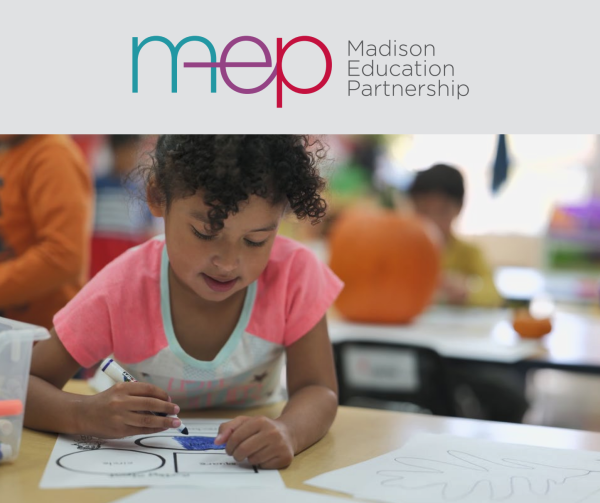New MEP reports examine second year of MMSD’s full-day 4K program
April 1, 2024 | By Karen Rivedal, WCER Communications

Two new reports from the Madison Education Partnership (MEP) look at differences in the experiences of students enrolled in full-day and half-day four-year-old kindergarten (4K) in the Madison Metropolitan School District (MMSD) during the 2022–2023 school year, which was the second consecutive year of the full-day 4K program.
Researchers assessed 341 4K students, observed 24 classrooms, and interviewed 23 teachers across full- and half-day classrooms. The team estimated differences in student achievement gains, as well as qualitative differences in instruction, time use, and culturally responsive or inclusive practices.
Researchers found no differences in learning growth in numeracy and executive functioning, on average, between students enrolled in the full- and half-day programs, even after controlling for demographic differences. Researchers found suggestive evidence that on average students in full-day 4K gain more on literacy assessments than half-day students, however this difference is imprecise, so the effect is interpreted with caution.
"While we cannot say for certain these differences are due to attending full-day 4K, these findings point to promising potential benefits of full-day 4K for learning gains in literacy," according to the reports from MEP, a research-practice partnership formed in 2016 between WCER and the school district.
Since 2011, MMSD has offered tuition-free, optional half-day 4K to its residents. The program operates in 4K classrooms in MMSD elementary schools, as well as in certain early care and education (ECE) sites. In 2021, MMSD began offering full-day programming in eight MMSD elementary schools. In 2022, the program expanded to include four additional schools and three ECE sites. Between 1,400 to 1,500 students enroll in the 4K program each year, and roughly two-thirds of these students attend MMSD elementary schools.
In the two new MEP reports, researchers found that full-day 4K classrooms did spend a larger proportion of time in whole group instruction compared to half-day 4K classrooms, which often included more routines-based activities, such as reviewing the classroom calendar and discussing the weather. The reports also found language arts and literacy activities were the most common instructional content across both types of classrooms.
Classroom observations for the reports showed teachers implementing similar numbers of culturally responsive or inclusive practices in half-day (92) and full-day (88) 4K classrooms. The most common types seen were individualized supports (such as accommodations for students with disabilities), community-building activities, and the use of non-standardized English (such as Spanish or American Sign Language).
In interviews, teachers reported that full-day 4K allowed them to focus better and fit in more activities at a more manageable pace, though some teachers said a full day of school may be tiring for some four-year-olds.
To assess gains in learning after students leave 4K, researchers also followed a sub-sample of five-year-old kindergarten (5K) students who had attended full- or half-day 4K the year before. On that front, researchers did not find any difference in learning gains in literacy, numeracy, or executive function between 5K students who had attended full-day 4K and those who had attended half-day 4K.
In interviews, some 5K teachers said full-day 4K may build children’s stamina for the full day of school in 5K, but 5K teachers also generally agreed that any amount of 4K programming provides children with a good foundation of knowledge and skills.
More findings and recommendations for future work and reflection can be found in the full learning gains report and the full classroom pedagogy report. Authors for the learning gains report are Rebecca Bier, Eric Grodsky, Beth Vaade, and Culleen Witthuhn. The pedagogy report was authored by Hailey Love, Juliana Correa, Grodsky, Vaade, Witthuhn, Linh Duong, and Yakob Lemma.
MEP also evaluated the first year of the full-day 4K program in 2021-2022, when they found similar amounts of learning gain in literacy, numeracy, and executive functioning for students in full-day and half-day classrooms.


